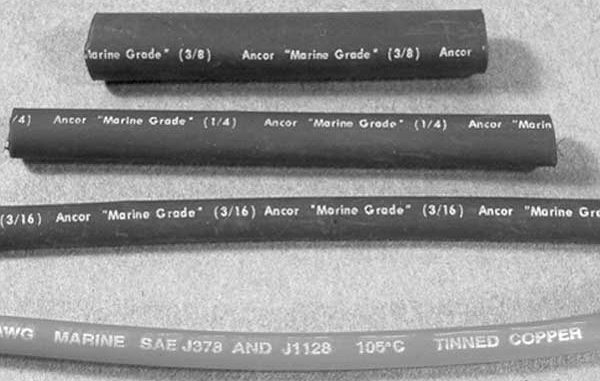
If there’s anything worse than having to do repairs, it’s having to do them over again because the materials you picked didn’t stand up to the marine environment.
Sun and moisture are the mortal enemies of nearly everything your boat is made of, and if you live near the coast, salt is even worse. The secret to making repairs last is using materials designed to resist these elements.
Marine-grade switches are sealed well enough to resist salt water and offer some protection against shock, vibration, UV, gasoline and oil.
Marine fuse holders are at least splash-resistant, and marine circuit breakers are waterproof. Switch and breaker panels built to marine grade standards use heavy copper bus strips mounted on insulated backing plates designed to survive in a saltwater environment. Waterproof marine electrics are usually also spark proof and safe for use in fuel tank and battery compartments.
Corrosion can start at the terminal end of an automotive grade wire used on a boat and spread like cancer under the insulation. Cutting off the corroded length can be a temporary fix, but once the corrosion starts the whole wire will eventually have to be replaced.
The insulation on cheap automotive wiring will deteriorate on a boat over a period of years to the point where it crumbles off.
Inexpensive switches, fuse holders and circuit breakers from your local discount or auto parts store can also lead to problems. Most automotive electrical parts simply aren’t designed to get wet, and when they do, they seem to rust or grow corrosion overnight.
If you can’t find marine-grade materials, good quality automotive parts can be used in protected areas if extra effort is taken to keep them dry. Spraying terminal ends and the terminals of circuit breaker and fuse panels with a clear battery terminal sealer or painting them with liquid electrical tape helps them resist corrosion and keeps the terminal screws from backing out.
Installing wiring clamps, fuse panels and similar fixtures calls for a variety of fasteners. If you’ve ever had to remove a rusted nut or screw, you understand how important it is to use only stainless steel hardware.
Unfortunately, the word “stainless” has become a generic term for a wide spectrum of steel alloys. Hardware made of nickel and chrome alloy marine-grade stainless steel is extremely hard and virtually rust free. It’s also hard to find. Take a magnet along when you shop at marine dealers, hardware stores and building supply centers. If a stainless item isn’t attracted to a magnet, it’s probably not going to rust.
Choosing the right sealant can also be confusing. Some tubes of sealant are prominently labeled for marine service but carry a warning in much smaller print that says they are not intended for use below the waterline.
Generally, silicone products are designed for above-water use and polyurethane and polysulfide products can safely be used below the waterline, but check the labels! Using an ineffective sealant on a fish-finder transducer’s mounting screws, for instance, could let water leak into the wooden core of a transom and shorten its life.
Sealants that are approved for submerged use can also be used above the waterline. Three typical products that can be used either place are 3M Marine’s Fast Seal 4200, Marine Sealant 101 and Adhesive/Sealant 5200.
The 4200 product has about half the strength of 5200, and can be used on parts that you expect to disassemble later, like sealing the covers over holes where fish-finder wires and transducer cables pass through consoles and transoms.
Marine Sealant 101 also allows disassembly. It’s a polysulfide that cures when exposed to moisture; in fact, the more moisture it comes in contact with the quicker it cures.
Boat makers use Adhesive/Sealant 5200 for permanent applications like sealing decks to hulls and leak-proofing motor-mount bolts and plumbing fittings that pass through the transom. Don’t use it where you might have to remove the sealed part.
Use the right marine grade components, and you should only have to do the job once.


